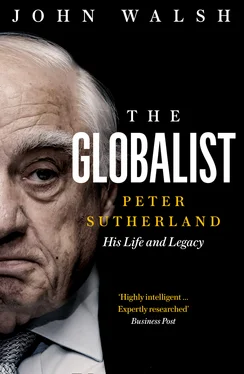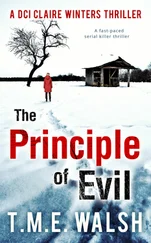When the story broke it caused a political crisis that quickly embroiled the two most senior members of An Garda Síochána, the Irish police. As Michael Noonan explains: ‘I had to have conversations with Garda commissioner Paddy McLoughlin and deputy commissioner Joe Ainsworth. I was relying on Peter [Sutherland] for legal advice on what was appropriate and not appropriate to say. It was very good advice.’
In 1978, Gerry Collins, Fianna Fáil justice minister at the time, had dismissed Garda commissioner Ned Garvey when it emerged that Garvey had placed Eamonn Barnes, the director of public prosecutions, under surveillance. When Garvey initiated proceedings against the state on the basis that it had abrogated his constitutional rights, the case went all the way to the Supreme Court, with Garvey emerging victorious. ‘The essence of the advice he gave me,’ continued Noonan, ‘was that when Gerry Collins was justice minister and the government dismissed Ned Garvey, Garvey won his case in the Supreme Court on the grounds of inappropriate procedure. He went through Supreme Court judgment so that I didn’t make any legal errors in conversations with McLoughlin and Ainsworth.’ Sutherland’s advice to Noonan on how to deal with McLoughlin and Ainsworth was sound because he had represented Garvey. He knew what, and more importantly, what not to do in such circumstances. As a result, both McLoughlin and Ainsworth retired from the force.
*
The phone-tapping scandal was only a minor skirmish, however, compared with what was to come next. In the early 1980s, the Catholic right was uniting under a banner of implacable opposition to abortion. The broad aim of the two main groups, the Society for the Protection of Unborn Children (SPUC) and the Pro-Life Amendment Campaign (PLAC), was to insert an amendment into the constitution that would prohibit abortion in Ireland in all circumstances. Moreover, they wanted to ensure that no Irish woman could travel abroad for an abortion – and that meant removing access to information about abortion services in other jurisdictions. In many ways Ireland was starting to resemble a theocracy more than a fully functioning democracy. There were very few developed countries at that time where the forces of the church and religious groupings could shape society to such an extent through state legislation.
The Catholic right had such heft that politicians ran scared rather than confront them. Dr Julia Vaughan was the leading figure in the Pro-Life Amendment Campaign, while some PLAC members were very senior lawyers in the Four Courts. The religious right took the view that it was necessary to place in the constitution an amendment that would do two things.
First, they wanted to rule out any possibility that the constitution would be used in the future as a vehicle to identify an unremunerated right to abortion by an interpretation of the rights to privacy – in other words, the kind of thing that had happened in the Roe v. Wade case in the United States. Second, there was also an even more radical group who believed that there should be a positive expression of the right to life in the constitution. In that period there were three elections, so any powerful advocacy or lobby group would obviously get a keen hearing from the political leadership of both parties. As a result, both Fianna Fáil and Fine Gael gave commitments to include wording in the constitution that would have the desired effect for the pro-life groups.
The religious right occupied key positions across the state and in Irish society. The number two civil servant in the attorney general’s office when Sutherland took over, a colourful figure called Matt Russell, was closely associated with PLAC. Even by the conservative standards of the time, he occupied the outer fringes of the right wing. A prominent member of Opus Dei, Russell was also instrumental in the collapse of the Fianna Fáil–Labour coalition in 1994 when it emerged in November of that year that he had not processed nine warrants for arrest of paedophile priest Fr Brendan Smyth.
PLAC had lobbied all parties before the 1981 general election to insert an amendment in the constitution that would make Ireland’s abortion laws ironclad. Garret FitzGerald, as leader of Fine Gael, made such a commitment but failed to follow through in the short-lived government. When Charlie Haughey was in government in 1982, PLAC had again come up with the wording it wanted inserted into the constitution. Haughey promised that he would hold a referendum to honour his commitment to PLAC. The pledge followed Haughey on the campaign trail when the government collapsed in November of that year, but put Garret FitzGerald in an invidious position. If Fine Gael failed to match Haughey’s commitment then it risked incurring the wrath of – and electoral rejection by – social conservatives. They had mobilised in such large numbers that they could potentially sway the outcome of the election.
FitzGerald opted to take a conservative approach and matched Haughey’s pledge. According to Mark FitzGerald, his father made the judgement that if he hadn’t given such a commitment he wouldn’t have won the election. ‘If he hadn’t won the election, I don’t think personally it would have bothered him if he hadn’t become Taoiseach. But he was very interested in solving the problems in Northern Ireland. He made the gamble on the Eighth Amendment even though his heart wasn’t in it, because he knew that if he didn’t then between the Church and Haughey they would wipe the floor. Well, they nearly did, it was a very close election.’
Alan Dukes, finance minister in the Fine Gael–Labour government formed in December 1982, recalls a meeting held while the party was still in opposition. He and a few like-minded party members, he says, had taken to referring to the Society for the Protection of Unborn Children, after the abbreviation of their name, as ‘Spuccers’. ‘The Spuccers were invited to make a presentation to the Fine Gael parliamentary party in October 1982. I remember it well. It was a bright sunny morning. The Spuccers came in and made the presentation, which I found very unusual. They then said they would like the views of every Fine Gael member present, which they would faithfully report back to their constituents. I remember having to make a conscientious effort not to tell them that it was okay, I would tell my constituents myself. But anyway, I didn’t. Then we had the election in November ’82. Then we were in government and Peter [Sutherland] was faced with the task of steering this through.’
Somewhat unusually, Michael Noonan became the sponsoring minister to steer through the Eighth Amendment in 1983. It should have been the responsibility of the health minister; in 2018, Simon Harris, Minister for Health, would be given responsibility for managing the referendum that removed the Eighth Amendment, and it was assumed that in 1983, Barry Desmond, the Labour Party health minister, would take charge of the proposed legislation. But Desmond vehemently opposed the proposal and refused to have anything to do with it. That is why Noonan was asked to take charge. ‘So it was transferred to me, the file was transferred from health to justice. There was nothing in the file except the words,’ Noonan recalls.
Normally a file containing a proposed piece of legislation, particularly one as contentious as the Eighth Amendment, would contain reams of analysis and legal opinion. There was nothing in the file bequeathed by the previous administration. ‘Except the little green words printed by Fianna Fáil, which said “to be included in the constitution”. It looked initially, my officials thought, that the words had been produced without analysis, but we found out subsequently that the words had been considered but there was no written analysis. It was produced outside the system,’ explains Noonan. It emerged that the wording of the amendment had not been prepared in consultation with any government department. It is the understanding of this book that the original proposal for the amendment was put together by Sutherland’s UCD lecturer in constitutional law, Justice John Blayney, a Supreme Court judge between 1992 and 1997. Blayney died in June 2018, aged ninety-three, one month after the Eighth Amendment was repealed through a referendum.
Читать дальше












